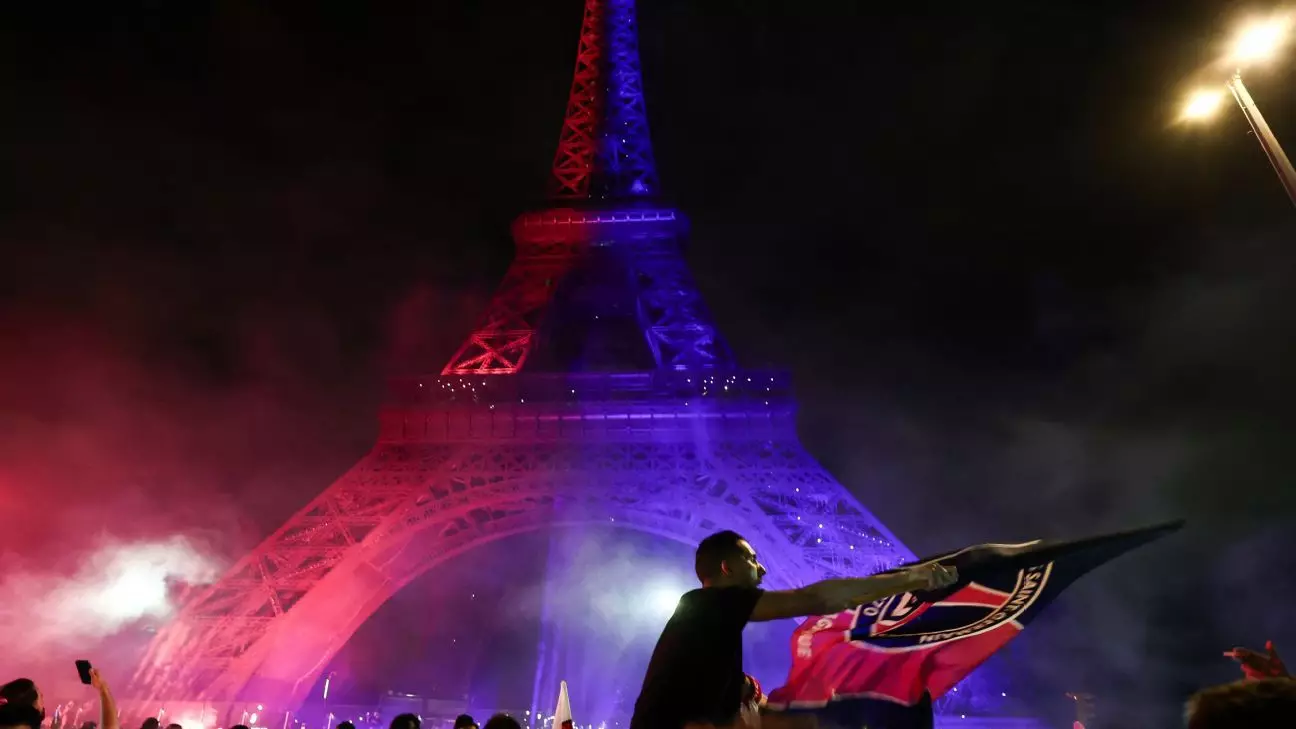The air was thick with euphoria as Paris Saint-Germain (PSG) clinched their much-anticipated Champions League title, a long-awaited moment for both players and supporters alike. The jubilant celebrations were marked by the Eiffel Tower glowing in the team’s blue, red, and white colors. Fans flooded the streets, collectively exulting in a 5-0 victory against Inter Milan. However, as night fell, the jubilance took a dark turn, revealing the stark contrast between celebration and tragedy. The deaths of two fans and the critical injury of a police officer served as tragic reminders of how quickly joy can sour.
While celebrations erupted in numerous locations across France, violence simmered beneath the surface. Reports emerged of a 17-year-old boy fatally stabbed at a street party in Dax, while a young man in Paris lost his life when a car struck his scooter amidst the chaos. Such incidents marred an otherwise triumphant occasion, painting a troubling picture of the interplay between exuberance and brutality during public celebrations.
Shattered Dreams and a Search for Accountability
The investigations into these tragic fatalities are likely to unfold amidst increasing scrutiny on the security measures and overall crowd control during large-scale events. While inspiration draws strength from the success of PSG, the grim events of the night beckon questions about public safety and accountability at such exuberant gatherings. Numerous others were injured, with reports indicating that 192 people required medical assistance; several suffered serious injuries, underscoring the pitfalls of crowd dynamics.
Particularly concerning was the incident involving a police officer who was seriously injured by fireworks. Such moments underscore not just the potential for violence within celebratory crowds, but also the unpredictability that comes with these high-octane events. What should have been a night of unity transformed into a nightmare for emergency responders, directly conflicting with PSG’s image as a beacon of culture, sports, and community pride.
Heightened Security Amidst Euphoria
With the swelling crowds, the Paris police were compelled to mobilize significant resources to maintain order. Parallels can be drawn to past celebrations, such as France’s World Cup victory in 2018, when similar episodes of unrest erupted. It appears that with every triumph, the risk of accompanying chaos escalates—suggesting that the very fabric of celebratory culture intertwined with an all-consuming need for public safety often falls apart under pressure.
In response to the night’s violence, authorities employed tactics like tear gas and water cannons to disperse unruly throngs at notable Parisian landmarks. While such strategies may serve the purpose of crowd control, they also risk exacerbating tensions among otherwise peaceful celebrants. The juxtaposition of festive excitement against aggressive police action creates a bitter irony; one that starkly contrasts the spirit of sport with societal safety measures.
Reflections on Collective Consciousness
As fans celebrated in iconic locations like Place de la Bastille, joy soared in moments of collective camaraderie—flares lit the night, with fans climbing the historic column and sharing songs of victory. Yet this ephemeral happiness coexisted with fear and disorder, raising questions about the psychology of crowds. What catalyzes otherwise law-abiding individuals to engage in violence during collective festivities? The fear of losing control appears magnified in environments steeped in high stakes and heightened emotions.
With 294 arrests already made by dawn, the statistics reveal the grim reality of these celebrations. Looting incidents—with stores ransacked and property damaged—paint an unsavory picture that stands at odds with the sport’s uplifting message. In examining these events, it is essential to shift focus from mere numbers to an understanding of the communal psyche that shapes actions during such pivotal moments.
As the PSG players prepare for their victory parade, questions linger like the smoke from celebratory flares: how can a passionate display of sportsmanship coexist with the threat of violence? And as communities converge to revel in the achievements of their heroes, we must reconcile the beautiful game with the societal challenges it unwittingly foreshadows.

